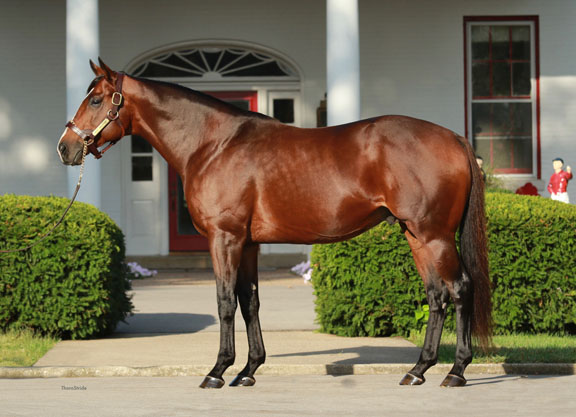What a tough game this is. You only get to show the first card in your hand before virtually the whole pile of chips is distributed. One or two players gather up their winnings, whooping triumphantly, and suddenly your own hopes of staying in the game–your hopes of a viable stud career in Kentucky–depend exorbitantly on the next card. Generally speaking, it doesn't matter if you turn out to have had a whole sheaf of aces farther into your hand. By the time you can turn those over, there will be nothing left on the table but empty glasses and a full ashtray.
We noted in the previous instalment that a third crop of juveniles, alongside a first crop of 4-year-olds, typically represents a final chance. Sure enough, compared with 18 Bluegrass stallions approaching that crossroads, we find just six left to review today from the preceding intake.
But whatever sympathy we feel for those meanwhile driven into regional or overseas programs, the nature of the business today means that they have actually delivered as legible and legitimate a sample of their work as we are ever going to get. So many stallions nowadays cover 500 mares across their first three seasons, only to find themselves reduced to a dozen or two within a couple of years. If anything, then, their embarrassment now should prompt us to revisit the vogue they enjoyed when first going to market–and perhaps the contrast might even make us hesitate before rushing to the next lot of rookies off the carousel.
In this group, however, there are a couple who have done something beyond almost all young stallions and created a sustainable niche in the market. Having made a brisk start with his first juveniles in 2018, in fact, GOLDENCENTS (Into Mischief–Golden Works, by Banker's Gold) entertained no fewer than 239 mares at Spendthrift the following spring and another 204 last year–taking him to an aggregate 1,133 through his first six years.
And he will presumably maintain the traffic, his farm having taken such a purposeful lead on fee cuts in the pandemic marketplace: for 2021 he's back down to his original fee of $15,000, from $25,000 last year.
Goldencents topped the third-crop championship in 2020 by nearly all indices, having previously been champion freshman by winners (second to studmate Cross Traffic by prize money) and then headed the second-crop table. Given his fairly industrial output, however, he is nothing like so dominant in percentage terms. It would be pushing things, certainly, to describe nine black-type winners and three graded stakes winners from 255 starters as a wildly exciting yield.
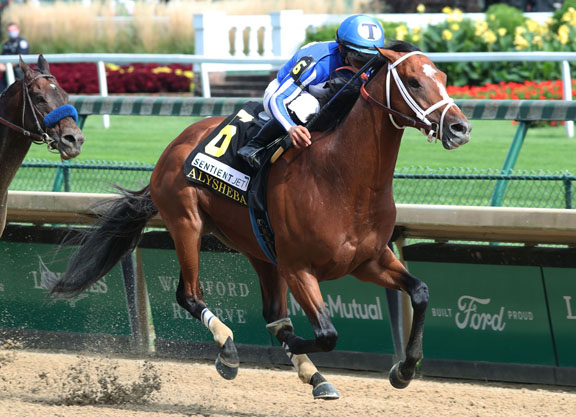
By My Standards has been a standard-bearer for Goldencents | Coady
But then Goldencents, having been one of the first to demonstrate his sire's capacity to upgrade mares, has also been in the vanguard in terms of testing whether that prowess will be recycled by his sons. He was just a $5,500 yearling, remember, out of a $7,000 mare by a stallion who ended up in Cyprus. The family did bring hardiness (next two dams respectively 18-for-45 and 13-for-46), but somehow Into Mischief ignited a spark of quality in Goldencents that burned up consecutive editions of the GI Breeders' Cup Dirt Mile. And while his sire was still available at $35,000 when Goldencents joined him at Spendthrift, his relative affordability has obviously been at a growing premium ever since.
Goldencents was blessed that his own first crop produced a couple who did much the same service, in promoting their sire, as he had himself performed for Into Mischief. In fact, By My Standards and Mr. Money remain far and away his biggest earners to date. And while neither has quite broken the Grade I ice, By My Standards certainly neared the top of the handicap division in his third season and has helped to keep his sire's names in lights all the way through.
Arguably it's about time Goldencents produced a new star, but that's precisely what he can hope to do after getting that reboot from his prolific first crop. In the meantime, admittedly, he has been treading water somewhat at the sales: while one daughter did bring $300,000, he averaged a steady $29,069 with his 2020 yearlings, for 52 sold of 68 offered.
That yield, and all the rest cited here, must of course be placed in the context of an exceptionally challenging market. Be that as it may, we will pretty soon have to cease doing what we're doing today–comparing these survivors against other stallions at the same stage of their career–and instead start measuring them against all those established operators who, having shed the commercial allure of novelty, have already chiselled a lasting foothold in the market.
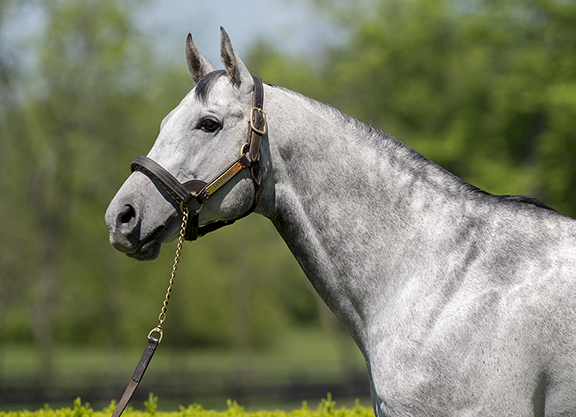
Cairo Prince | Sarah Andrew
Sticking to this group, however, you couldn't ask for a more instructive foil to Goldencents than CAIRO PRINCE (Pioneerof the Nile–Holy Bubbette, by Holy Bull). They have reached this point absolutely in tandem: Goldencents has 384 named foals, Cairo Prince 380; Goldencents has had 256 starters, Cairo Prince 249; Goldencents has 158 winners, Cairo Prince 156; they both, moreover, have 26 black-type horses. Sure enough, they stand for the same fee. But it's the Airdrie stallion who has a slight but consistent edge at the top end: by stakes winners (13 plays nine), graded stakes winners (five plays three) and graded stakes horses (ten plays seven).
Moreover Cairo Prince is one of those rare stallions whose initial market reception was way out of line with the ranking implied by his opening fee. We've seen, throughout this series, how that seldom guarantees anything–whether for better or worse. In this case, however, it has turned out that Cairo Prince was quite rightly “found” as a $10,000 start-up.
His stock was received with such enthusiasm that he actually earned two fee hikes before he had a single runner, an extremely rare accolade. And if he, too, has now required a trim from $25,000, then the buzz he generated with his sales debut in 2017–when he achieved a staggering average yield of 15 times his fee–will only now start to tell in the improved quality of his mares.
True, commercial opportunism tends to be finite wherever it occurs in the cycle, and Cairo Prince dropped to 87 mares last spring after being basically fully subscribed to that point. But it's a confident bet that the juveniles heading to the track this year, conceived after that remarkable sales debut, will give fresh commercial kudos to the foals he breeds this time round.
In the meantime, Cairo Prince continues to impress with his sales stock, averaging $47,601 for 57 sold of 78 offered in 2020, confirming him far and away the most resilient and productive sales sire in this group. He just needs his big horse, now, but he's having an excellent winter on the track (three new stakes winners over the past month) and, nationally, only Into Mischief, Tapiture, Not This Time and American Pharoah had more juvenile winners last year. And it certainly does no harm that he now has another productive young stallion so close up, his Grade I-placed half-sister having gained new celebrity as dam of WinStar's thriving rookie Outwork (Uncle Mo).
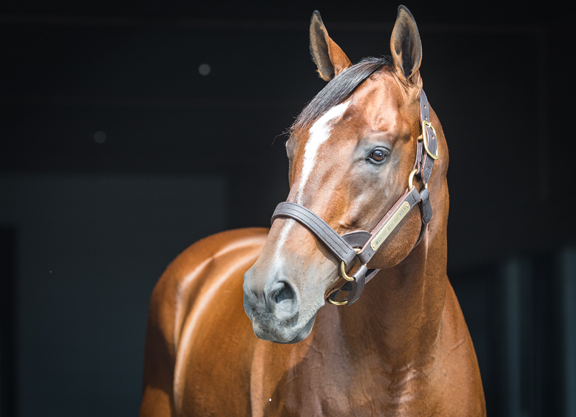
Mucho Macho Man | EquiSport Photos
In 2020, however, the star turn in this group was MUCHO MACHO MAN (Macho Uno–Ponche de Leona, by Ponche), who inserted himself between Goldencents and Cairo Prince in the third-crop prize money table with two Grade I winners. In previous years, of course, Mucho Gusto's success in the Pegasus World Cup would have been still more lucrative. Moreover that horse was unfortunate to be sidelined after his trip to the desert and only resurfaced when fourth behind Cairo Prince's latest graded stakes winner, Kiss Today Goodbye, in the GII San Antonio S. at Christmas.
Anyhow his sire followed through with an elite success on turf, as well, Rodeo Drive S. winner Mucho Unusual having meanwhile added another two graded stakes even since Christmas. In fact, with a total 51 winners from just 77 starters in 2020, Mucho Macho Man topped the national field last year in earnings-per-foal–and, importantly, we know that his stock is just going to keep thriving. Though precocious enough to contest all three legs of the Triple Crown before his third birthday, he kept filling that great rangy frame of his to win the GI Breeders' Cup Classic at five.
These results are barely filtering through to the commercial market, as he averaged $24,883 for 21 yearling sales of 28 offered, but then he only stands for $7,500. And he goes well at the juvenile sales (Mucho Gusto made no less than $625,000!) just as we should expect of a stallion who relies on deeds not hype. He's a mad outcross but is quietly earning his stripes and hopefully people are beginning to pay attention. His third book had dwindled to just 35, but he has since welcomed 96, 86 and 77 guests to Hill 'n' Dale at Xalapa. Lot of horse for the money, in every way.
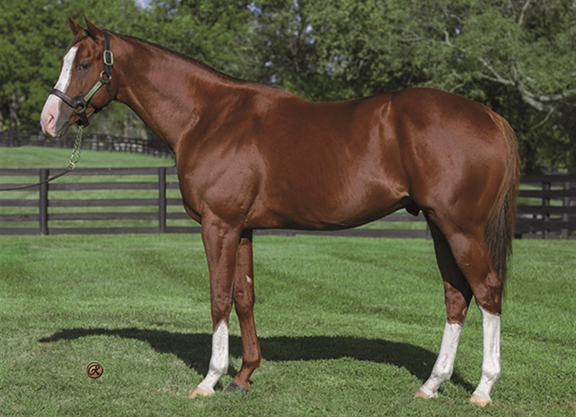
Will Take Charge | Louise Reinagel
The rival Mucho Macho Man nosed out for his greatest success was a barely less imposing creature, but now finds himself on a rather less encouraging tangent. It seems a long time, certainly, since WILL TAKE CHARGE (Unbridled's Song–Take Charge Lady, by Dehere) set out at $30,000 and duly dominated this lot in their sales debut with a $169,190 average. This time round he cashed out 37 of 41 for just $13,712, and he's down to a bargain $5,000 at Three Chimneys after being reduced to a very small book last spring.
Will Take Charge has mustered a handful of stakes winners, notably Grade I-placed sprinter Manny Wah, and maybe he will just prove a slow burner, as will sometimes happen with such a scopey horse. His was an especially fine constitution by the standards of his sire, highlighted by an 11-start sophomore campaign that started in January and ended, 26 days after his huge run at the Breeders' Cup, with success in the GI Clark H. His maternal family, meanwhile, has only become more aristocratic with the rise of Omaha Beach (War Front). Everything seemed to be in place so it would be a mystery, as well as a pity, if he can't turn things round.
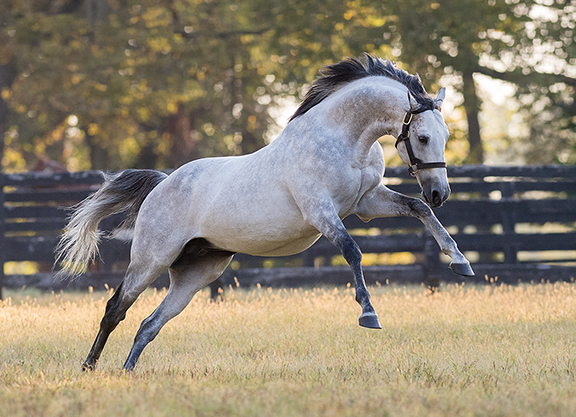
Cross Traffic | Sarah Andrew
CROSS TRAFFIC (Unbridled's Song–Stop Traffic, by Cure the Blues) is by the same sire and made a stronger start in contesting the succession, helped to the freshman's title by Breeders' Cup champion Jaywalk but also topping the class by overall stakes winners/ performers.
He has not quite maintained that flying start and Spendthrift, who briefly rewarded his freshman title with a hike to $25,000, will be hoping for a reset after halving him from $15,000 to $7,500 this time round. But there are solid grounds for optimism.
For a start, Cross Traffic is no longer dining out simply on Jaywalk. Among his second crop, Ny Traffic carried his standard very valiantly–never more conspicuously than when running Authentic (Into Mischief) himself to a head in the GI Haskell, while he was previously only beaten a length by Maxfield in the GIII Matt Winn S.
And Cross Traffic can soon expect a healthy spike in the graph, with his post-freshman, 2019 book having soared to 188 mares from 60. True, he promptly sank to 59 last year, but that's how fecklessly the commercial market works nowadays. The thing to remember now is that he will have that big crop of juveniles next year, so he's another who can hope that foals conceived this spring may ride fresh headlines on the track.
True, Cross Traffic stands in need of that revival after averaging just $11,630 for the 16 yearlings of 17 sent into the pandemic market, but at least he has exactly that chance brewing. Let's not forget how naturally talented he was, nailed only on the line in the stallion-making GI Met Mile just four months after his debut (got his Grade I next time).
As noted, many stallions in this group have been sold to regional programs or exported, and we're particularly sorry that Fed Biz (great work, Highfield Farm of Alberta!) and Noble Mission (GB) weren't able to get adequate traction. One or two others, however, appear to have slipped off Kentucky rosters with zero announcements on their relocation. I know the farms in question will have applied impeccable standards in deciding their future but it would be a concern if due candour about their “failure,” after so brief an opportunity, is being viewed as too instructive of the flimsiness of the commercial model.
The only other member of this intake apparently still operating in the Bluegrass on a commercial basis is REAL SOLUTION (Kitten's Joy–Reachforthe-heavens, by Pulpit). Actually he has reversed the standard procedure, having returned to Calumet after a couple of years in Louisiana early on. But he certainly fits the bill for this farm as a dual Grade I winner on turf, with venerable Classic influences seeding his family: his third dam is a Northern Dancer half-sister to champion Slew o' Gold (Seattle Slew) and Classic winner Coastal (Majestic Prince), as well as to the dam of Aptitude (A.P. Indy).
Real Solution covered just 27 mares last spring and his handful of yearlings couldn't work even a $5,000 fee, but he's had a $675,000 2-year-old and, bottom line, he's there to breed runners. That's just what he produced (thanks to the breeders who made his sire) in Ramsey Solution, who is five-for-nine including a $300,000 stakes at Kentucky Downs last September.
In fact, Real Solution has had 33 winners from just 44 starters overall, including three at black-type level; while $10,000 yearling and six-time winner Queens Embrace earned a Grade II placing at Saratoga last summer. That shows what can be done if your priorities are right, and Real Solution could appeal to enlightened breeders as being well named.
In the long term, after all, the breed will suffer badly if people can only afford to use fast-buck commercial sires who are expelled from the Bluegrass the moment their first yearlings leave the sales ring. With so few stallions surviving in this intake, however, we'll combine them with the preceding class for a composite “value podium” next time.
The post Kentucky Sires for 2021: Fourth-Crop Stallions appeared first on TDN | Thoroughbred Daily News | Horse Racing News, Results and Video | Thoroughbred Breeding and Auctions.
